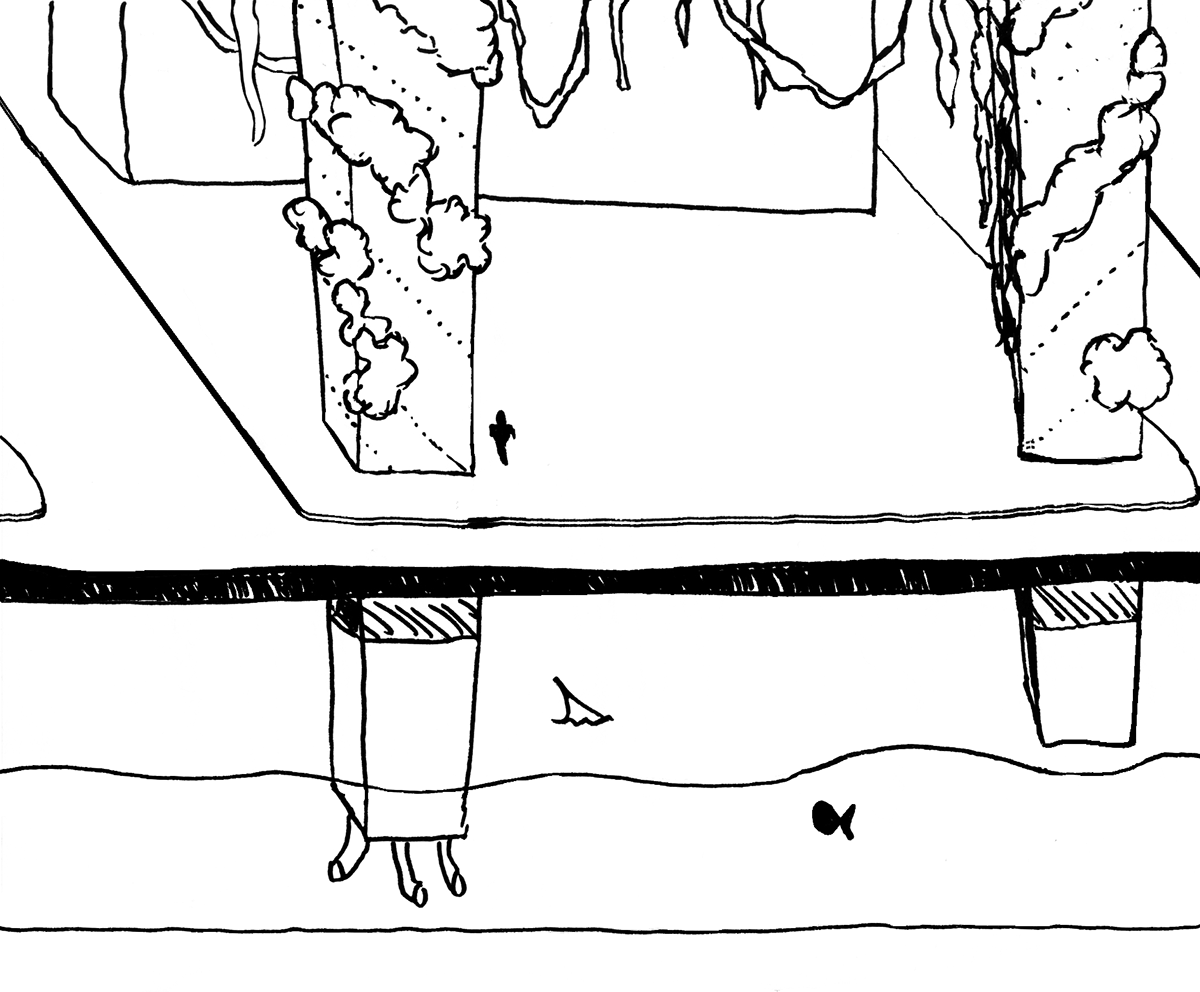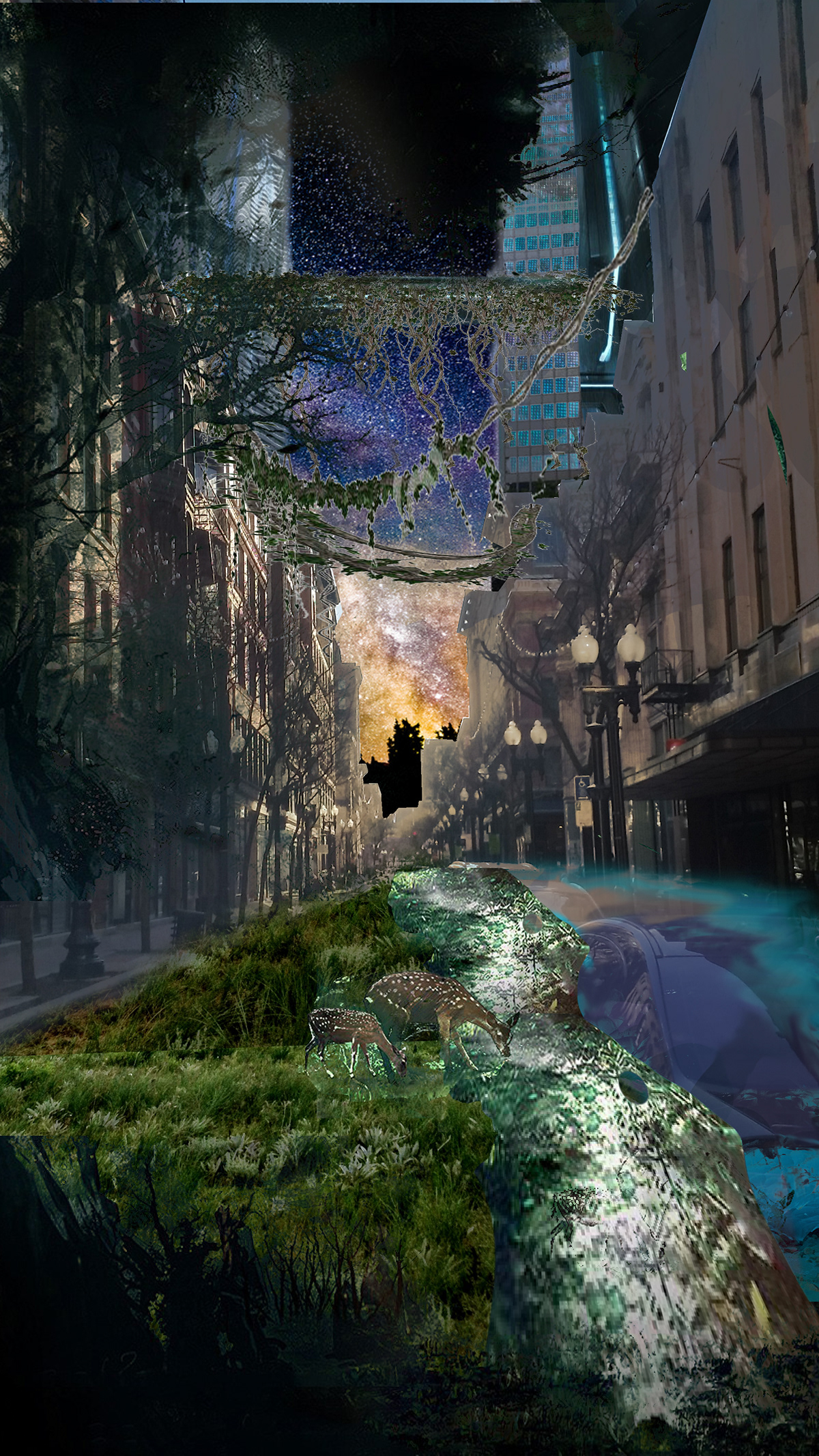Upwards
An exploratory narrative of the Future City

'Chirp chirp… chirp chirp'… I wake up gently to the sound of birds outside my urban window. I can feel a gentle breeze and the smell of fresh spring in the air. A perfect city morning to start my new job. The date August 1st, 2215, and I have just finished a training season at a local science coop, ready to begin my apprenticeship at the local oxygen lab.
In the past, someone of my age might be starting college, but now those antiquated methods of formal education are rarely used, as it is no where near as advanced as what you can learn at a coop. I have chosen to study in one of the many urban arboretums. where we cultivate oxygen by caring for trees. Primitive brick and concrete structures, that were once used to keep people indoors, have been repurposed into above ground farms and tree beds.
Most of the floors and interior of the structures have eroded away, and the shell is all the remains. We have installed research platforms at various levels, to ensure the tree roots stay healthy while growing. As the tree matures, the roots become stronger, and able to thrive on their own without the support of the shell. By the time the shell of the building has completely eroded away, the tree will be strong and healthy enough to survive on its own. New structures grow up instead of out, using older buildings as new foundations. The earth has been reclaimed by nature, and now we build upwards, relinquishing the ground level back to nature, occupying the space above it.
Around the year 2100 and our natural resources were depleted. For years they had been on the verge, and we were warned. We knew years before it happened, and we could have changed it. But somehow, people remained in denial of science, of facts. It was easier at the time to ignore it, and say, “Why don’t we fix it tomorrow, we have bigger problems right now.” And it was true, there always seemed to be bigger problems, the ones we could see and feel in the Now.
So we carried on like there was no tomorrow. Eventually, tomorrow came. Not only had we depleted our resources, we used up most of our space. Cities became gigantic, consuming the atmosphere nurturing them. So many pipes and tunnels and sewers ran beneath the city, there was no where for plants to grow. There was a heavy, thick smog that blanketed the densely, neglected space.


The air was dirty and the water was toxic. People desperately began looking for solutions, in ways they never had before. The landfills were full, overflowing into the oceans. Fish were all but extinct, depleting a major food source. The first thing that changed was waste management. Recycling was taken to an extreme level. There was no where to put the trash, so people just stopped producing it. It took some time, but eventually people figured out that the easiest way to produce less waste was to eat only compost-able foods. Most people converted to a home grown, vegetarian diet, with occasional meats. Wind and solar energy became the preferred and cheapest sources of energy, until geothermal and modern renewable energy methods were developed making energy nearly free for everyone in 2150.
People were desperate for an answer. Usually, they would turn to politics, or war, but that did not help. The only way to win this battle was to learn, to study and to find a new solution. The one and only priority became education. No one was looking at test scores, people were only looking for real knowledge that would lead to solutions. From and early age, kids were encouraged to be creative, hands on and have plenty of time to play outside. Within 25 years there were countless viable, renewable energy solutions coming out of the top science coops, leaving traditional universities a thing of the past. Education became a survival skill, and we stopped keeping score. And with this new attitude, we embraced the inherent abilities of the amazing nature surrounding us every day and found new ways to survive, and thrive. Technological advances began to improve the quality of life the environment. Building materials were able to breathe and filter the once smog-filled air. New construction became so reliable, affordable and able to adapt to new advances that by the year 2200, in a major city, you seldom hear or see construction.
Mankind has always been able to endure and adapt. We started as nomads, evolving into farmers. We developed medicine and vaccines. We developed communication to share innovations with each other. And finally, when we were forced to because of our disregard for mother nature, we had to evolve again and learn how to use nature and science to survive. We are very careful not to repeat our past, and the continue advancing the future, so we constantly study nature and science and the arts.






